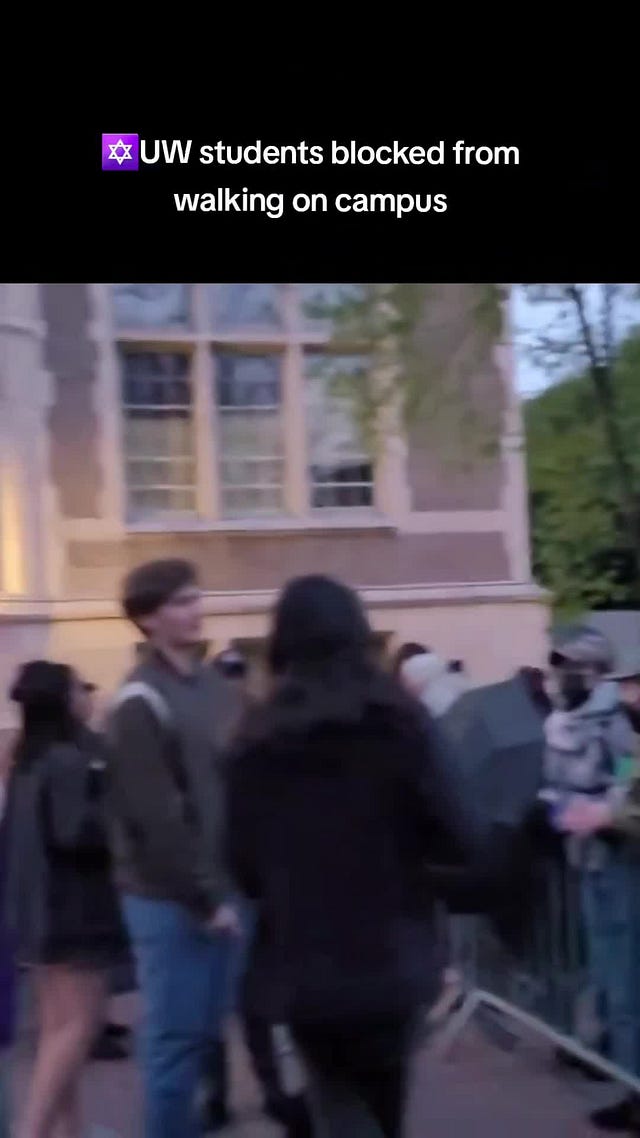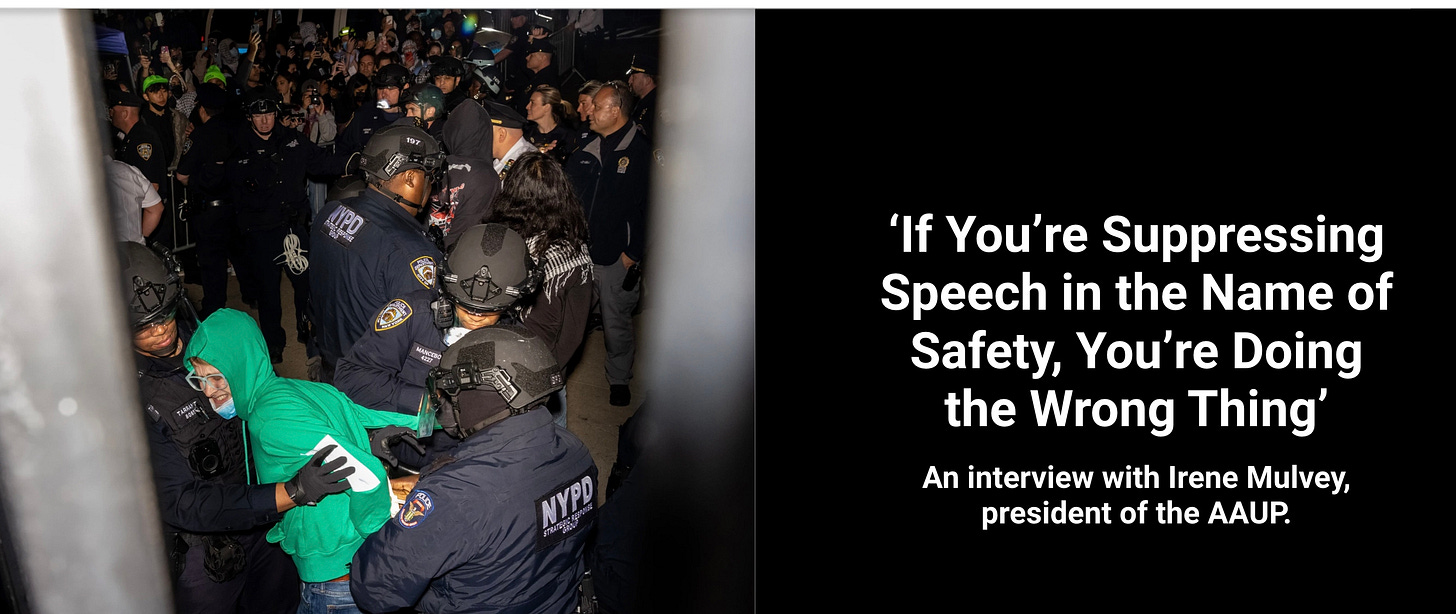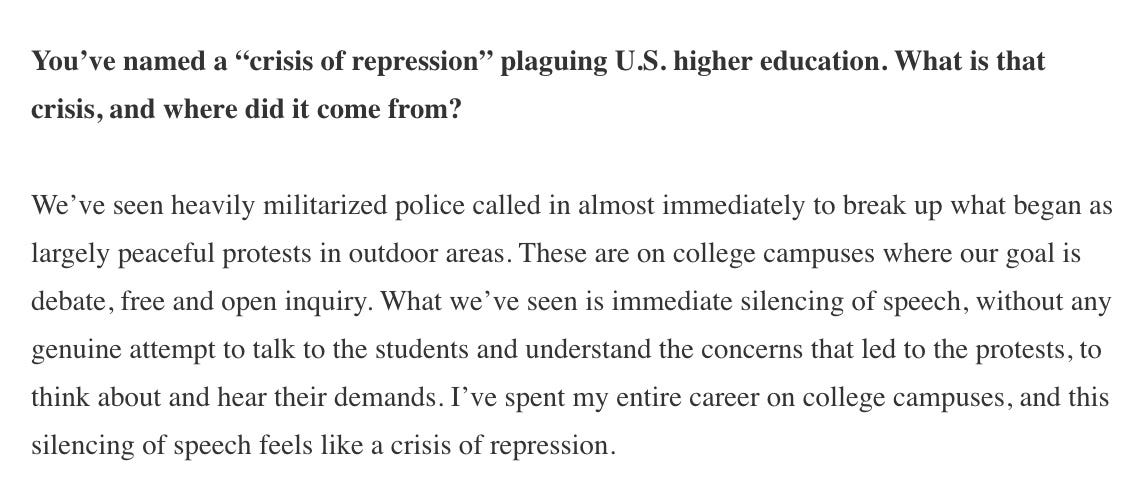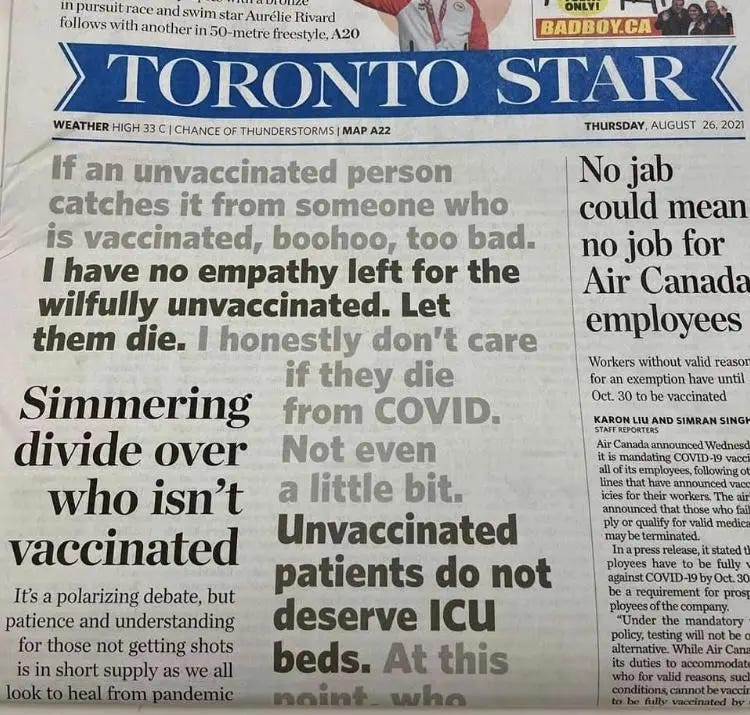You hold up an apple, and the person sitting across from you looks confused. “I’m not sure what it is,” he says. You tell him it’s an apple, and he rolls his eyes. “I don’t know what it is,” he says, “but the one thing I know for certain is that it definitely isn’t an apple.” He’s very angry at you for trying to mislead him.
Sick institutions keep diagnosing themselves, and it keeps becoming more and more clear that the people inside the sick institutions can’t see anything. I mean, anything. They live in a profound mental fog; nothing is so crushingly obvious that they can bring themselves to notice it. So let’s hold up the apple — let’s compare the thing to the way people looking at the thing describe it.
The surviving encampments on college campuses are going Full Stanford Prison Experiment, sealing themselves off and adding symbols to the performance. The only video I can find of this recent interaction on the University of Washington campus is posted on TikTok and Twitter, so I’m stuck with using those suboptimal platforms to show this:
 Tiktok failed to load.
Tiktok failed to load.Enable 3rd party cookies or use another browser
The encampments are closed, shutting down portions of university campuses on a series of outrageous identity and ideology tests, and the people inside the encampments have adopted masks, dumb cosplay riot shields, and armbands. Please notice that they’re wearing armbands, for crying out loud. The Twitter video is longer and clearer, and here’s a screenshot:
Brief reminder that I saw this behavior myself, visiting the encampment at UCLA and seeing that they had gates, guards, and identity tests for entry to the camp. They are closing portions of college campuses: only our kind are allowed behind this gate.
Here’s how the president of the American Association of University Professors describes the decision on some campuses to break up these closed encampments and restore open campuses, in an interview with the Chronicle of Higher Education:
I agree with the premise, but applying it in this context is willfully obtuse. I just edited my original descriptive choice at the end of that last sentence to make it significantly more polite. Sample exchange:
Openness is closedness; breaking up closed encampments that exclude people on the basis of identity and ideology is shutting down open inquiry. The people in masks, carrying shields, wearing armbands, behind closed gates — those people embody our culture of openness. (Yes, yes: In the current environment, people in masks and armbands actually do embody the culture of academic openness. But they’re not supposed to, is the theory.)
Shortly after demanding respect for open debate and free inquiry between people with differing views, by the way, she says that university leaders should refuse to discuss the encampments with Republican elected officials, because Republicans are very bad. “It would be nice to see somebody call out these hearings for the performative political theater that they are. It’s ridiculous to call them hearings because nobody’s listening.”
See also the AAUP’s recent declaration that congressional inquiry into university actions is “totalitarian.” We must protect the culture of open debate by refusing to have any.
This person can’t see the thing that she’s pretending to describe, at all, and she can’t even begin to hear herself. She’s sealed off, much like the encampments she’s defending. I’m seeing this description of “heavily militarized police” all over the discussion in academia, by the way, and I keep wondering what it means. The raids were preceded by artillery bombardment? They had close air support, and A-10s did gun runs? “You’re cleared hot on the latte cart.”
Of course what they mean is that the police looked scary, the same description that turns a black rifle into an assault weapon. The police wore helmets — that’s like being the MILITARY! A complete summary of the sophistication on display in political arguments from prominent academics.
Meanwhile, at Politico, the longtime journalist Jack Shafer sucks his thumb with great vigor:
Journalism, you see, is the practice of challenging authority with tough, hard-hitting inquiry, but we’re losing that culture of swaggering boldness in the face of power.
Yes, I can’t imagine why conventional journalism is in such steep decline. Oh no, we’re losing their commitment to challenging authority.









I was immediately reminded of this clip I just saw:
https://twitter.com/tomselliott/status/1788541985516646564
MSNBC’s AnaCabrera : “More independents say they worry about Pres. Biden weakening democracy than Trump, 53% to 42%. What do you make of this?”
Susan Del Percio: “I find it shocking, honestly. I can’t — I can’t, you know, make sense of that number”
---------
Experts are baffled about why people think the president running on a platform of lawfare and censorship is considered a bigger danger to democracy than the Bad Orange Man. Don't they know the Bad Orange Man is Bad?!?!?!?
Nothing is more indicative of our decay than the faculty run encampment at The New School in Manhattan. Conveniently set-up in a lobby, as opposed to even a quad, the professors told reporters - "We thank our students for showing us the way; for being our teachers.” Exactly. The grown-ups have long since left the building.